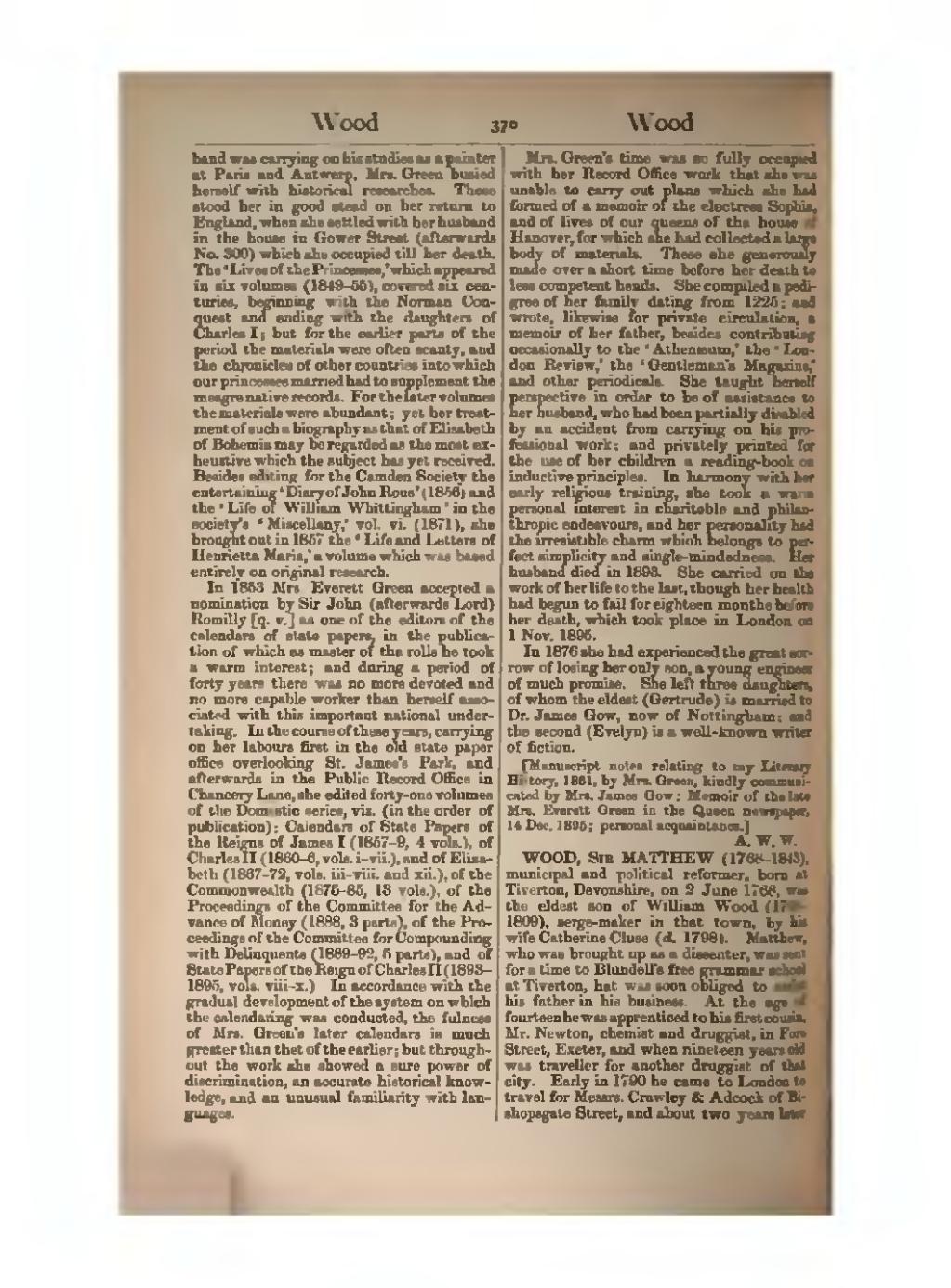band was carrying on his studies as a painter at Paris and Antwerp, Mrs. Green busied herself with historical researches. These stood her in good stead on her return to England, when she settled with her husband in the house in Gower Street (afterwards No. 300) which she occupied till her death. The ‘Lives of the Princesses,’ which appeared in six volumes (1849–55), covered six centuries, beginning with the Norman Conquest and ending with the daughters of Charles I; but for the earlier parts of the period the materials were often scanty, and the chronicles of other countries into which our princesses married had to supplement the meagre native records. For the later volumes the materials were abundant; yet her treatment of such a biography as that of Elisabeth of Bohemia may be regarded as the most exhaustive which the subject has yet received. Besides editing for the Camden Society the entertaining ‘Diary of John Rous’ (1856) and the ‘Life of William Whittingham’ in the society's ‘Miscellany,’ vol. vi. (1871), she brought out in 1857 the ‘Life and Letters of Henrietta Maria,’ a volume which was based entirely on original research.
In 1853 Mrs. Everett Green accepted a nomination by Sir John (afterwards Lord) Romilly [q. v.] as one of the editors of the calendars of state papers, in the publication of which as master of the rolls he took a warm interest; and during a period of forty years there was no more devoted and no more capable worker than herself associated with this important national undertaking. In the course of these years, carrying on her labours first in the old state paper office overlooking St. James's Park, and afterwards in the Public Record Office in Chancery Lane, she edited forty-one volumes of the Domestic series, viz. (in the order of publication): Calendars of State Papers of the Reigns of James I (1857–9, 4 vols.), of Charles II (1860–6, vols. i–vii.), and of Elizabeth (1867–72, vols. iii–viii. and xii.), of the Commonwealth (1875–85, 13 vols.), of the Proceedings of the Committee for the Advance of Money (1888, 3 parts), of the Proceedings of the Committee for Compounding with Delinquents (1889–92, 5 parts), and of State Papers of the Reign of Charles II (1893–1895, vols. viii–x.). In accordance with the gradual development of the system on which the calendaring was conducted, the fulness of Mrs. Green's later calendars is much greater than that of the earlier; but throughout the work she showed a sure power of discrimination, an accurate historical knowledge, and an unusual familiarity with languages.
Mrs. Green's time was so fully occupied with her Record Office work that she was unable to carry out plans which she had formed of a memoir of the electress Sophia, and of lives of our queens of the house of Hanover, for which she had collected a large body of materials. These she generously made over a short time before her death to less competent hands. She compiled a pedigree of her family dating from 1225; and wrote, likewise for private circulation, a memoir of her father, besides contributing occasionally to the ‘Athenæum,’ the ‘London Review,’ the ‘Gentleman's Magazine,’ and other periodicals. She taught herself perspective in order to be of assistance to her husband, who had been partially disabled by an accident from carrying on his professional work; and privately printed for the use of her children a reading-book on inductive principles. In harmony with her early religious training, she took a warm personal interest in charitable and philanthropic endeavours, and her personality had the irresistible charm which belongs to perfect simplicity and single-mindedness. Her husband died in 1893. She carried on the work of her life to the last, though her health had begun to fail for eighteen months before her death, which took place in London on 1 Nov. 1895.
In 1876 she had experienced the great sorrow of losing her only son, a young engineer of much promise. She left three daughters, of whom the eldest (Gertrude) is married to Dr. James Gow, headmaster of Westminster School; and the second (Evelyn) is a well-known writer of fiction.
[Manuscript notes relating to my Literary History, 1861, by Mrs. Green, kindly communicated by Mrs. James Gow; Memoir of the late Mrs. Everett Green in the Queen newspaper, 14 Dec. 1895; personal acquaintance.]
WOOD, Sir MATTHEW (1768–1843), municipal and political reformer, born at Tiverton, Devonshire, on 2 June 1768, was the eldest son of William Wood (1738–1809), serge-maker in that town, by his wife Catherine Cluse (d. 1798). Matthew, who was brought up as a dissenter, was sent for a time to Blundell's free grammar school at Tiverton, but was soon obliged to assist his father in his business. At the age of fourteen he was apprenticed to his first cousin, Mr. Newton, chemist and druggist, in Fore Street, Exeter, and when nineteen years old was traveller for another druggist of that city. Early in 1790 he came to London to travel for Messrs. Crawley & Adcock of Bishopsgate Street, and about two years later
